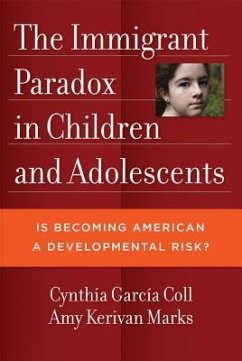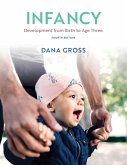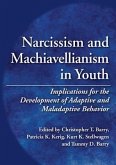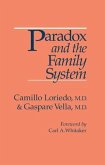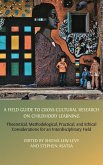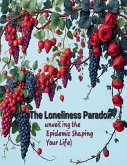The Immigrant Paradox in Children and Adolescents: Is Becoming American a Developmental Risk?
Herausgeber: García Coll, Cynthia; Marks, Amy
The Immigrant Paradox in Children and Adolescents: Is Becoming American a Developmental Risk?
Herausgeber: García Coll, Cynthia; Marks, Amy
- Gebundenes Buch
- Merkliste
- Auf die Merkliste
- Bewerten Bewerten
- Teilen
- Produkt teilen
- Produkterinnerung
- Produkterinnerung
Many academic and public policies promote rapid immigrant assimilation. Yet, researchers have recently identified an emerging pattern, known as the immigrant paradox, in which assimilated children of immigrants experience diminishing developmental outcomes and educational achievements. This examines these findings by asking how and why highly acculturated youth may fare worse than their less assimilated peers, and under what circumstances this pattern is disrupted.
Andere Kunden interessierten sich auch für
![Infancy Infancy]() Dana GrossInfancy96,99 €
Dana GrossInfancy96,99 €![Infancy Infancy]() Dana GrossInfancy109,99 €
Dana GrossInfancy109,99 €![Narcissism and Machiavellianism in Youth: Implications for the Development of Adaptive and Maladaptive Behavior Narcissism and Machiavellianism in Youth: Implications for the Development of Adaptive and Maladaptive Behavior]() Narcissism and Machiavellianism in Youth: Implications for the Development of Adaptive and Maladaptive Behavior31,99 €
Narcissism and Machiavellianism in Youth: Implications for the Development of Adaptive and Maladaptive Behavior31,99 €![Paradox And The Family System Paradox And The Family System]() Camillo LoriedoParadox And The Family System72,99 €
Camillo LoriedoParadox And The Family System72,99 €![A Field Guide to Cross-Cultural Research on Childhood Learning A Field Guide to Cross-Cultural Research on Childhood Learning]() A Field Guide to Cross-Cultural Research on Childhood Learning100,99 €
A Field Guide to Cross-Cultural Research on Childhood Learning100,99 €![The Life Space of the Urban Child The Life Space of the Urban Child]() Gunter MeyThe Life Space of the Urban Child179,99 €
Gunter MeyThe Life Space of the Urban Child179,99 €![The loneliness paradox The loneliness paradox]() AngleThe loneliness paradox26,99 €
AngleThe loneliness paradox26,99 €-
-
-
Many academic and public policies promote rapid immigrant assimilation. Yet, researchers have recently identified an emerging pattern, known as the immigrant paradox, in which assimilated children of immigrants experience diminishing developmental outcomes and educational achievements. This examines these findings by asking how and why highly acculturated youth may fare worse than their less assimilated peers, and under what circumstances this pattern is disrupted.
Produktdetails
- Produktdetails
- Verlag: American Psychological Association (APA)
- Seitenzahl: 328
- Erscheinungstermin: Oktober 2011
- Englisch
- Abmessung: 260mm x 183mm x 23mm
- Gewicht: 776g
- ISBN-13: 9781433810534
- ISBN-10: 1433810530
- Artikelnr.: 33804724
- Herstellerkennzeichnung
- Libri GmbH
- Europaallee 1
- 36244 Bad Hersfeld
- gpsr@libri.de
- Verlag: American Psychological Association (APA)
- Seitenzahl: 328
- Erscheinungstermin: Oktober 2011
- Englisch
- Abmessung: 260mm x 183mm x 23mm
- Gewicht: 776g
- ISBN-13: 9781433810534
- ISBN-10: 1433810530
- Artikelnr.: 33804724
- Herstellerkennzeichnung
- Libri GmbH
- Europaallee 1
- 36244 Bad Hersfeld
- gpsr@libri.de
Edited by Cynthia García Coll and Amy Kerivan Marks
Contributors
Preface
Introduction
Cynthia García Coll and Amy Kerivan Marks
I. Is There an "Immigrant Paradox"?
1. Children in Immigrant Families: Demography, Policy, and Evidence for
the Immigrant Paradox
Donald J. Hernandez, Nancy A. Denton, Suzanne Macartney, and Victoria
L. Blanchard
2. Historical Origins of the Immigrant Paradox for Mexican American
Students: The Cultural Integration Hypothesis
Raymond Buriel
3. Studying the Immigrant Paradox in the Mexican-Origin Population
Robert Crosnoe
II. Behavior and Health Outcomes Across Generations
1. Behavioral Outcomes in Early Childhood: Immigrant Paradox or
Disadvantage?
Kristen Turney and Grace Kao
2. Exploring the Immigrant Paradox in Adolescent Sexuality: An
Ecological Perspective
Marcela Raffaelli, Hyeyoung Kang, and Tristan Guarini
3. Immigrant Generational Status and Delinquency in Adolescence:
Segmented Assimilation and Racial–Ethnic Differences
Hoan N. Bui
III. Family and Community Factors Affecting Academic Outcomes
1. Bilingualism and Academic Achievement: Does Generation Status Make a
Difference?
Wen-Jui Han
2. An Immigrant Advantage in the Early School Trajectories of Latino
Preschoolers From Low-Income Immigrant Families
Natalia Palacios
3. Student Engagement, School Climate, and Academic Achievement of
Immigrants' Children
Suet-ling Pong and Kristina L. Zeiser
4. Immigrant Gateway Communities: Does Immigrant Student Achievement
Vary by Location?
Dylan Conger and Meghan Salas Atwell
5. In Spite of the Odds: Undocumented Immigrant Youth, School Networks,
and College Success
Roberto G. Gonzales
6. Immigrant Youth in Postsecondary Education
Lingxin Hao and Yingyi Ma
IV. Concluding Remarks
1. The Intersection of Aspirations and Resources in the Development of
Children From Immigrant Families
Andrew J. Fuligni
Index
About the Editors
Preface
Introduction
Cynthia García Coll and Amy Kerivan Marks
I. Is There an "Immigrant Paradox"?
1. Children in Immigrant Families: Demography, Policy, and Evidence for
the Immigrant Paradox
Donald J. Hernandez, Nancy A. Denton, Suzanne Macartney, and Victoria
L. Blanchard
2. Historical Origins of the Immigrant Paradox for Mexican American
Students: The Cultural Integration Hypothesis
Raymond Buriel
3. Studying the Immigrant Paradox in the Mexican-Origin Population
Robert Crosnoe
II. Behavior and Health Outcomes Across Generations
1. Behavioral Outcomes in Early Childhood: Immigrant Paradox or
Disadvantage?
Kristen Turney and Grace Kao
2. Exploring the Immigrant Paradox in Adolescent Sexuality: An
Ecological Perspective
Marcela Raffaelli, Hyeyoung Kang, and Tristan Guarini
3. Immigrant Generational Status and Delinquency in Adolescence:
Segmented Assimilation and Racial–Ethnic Differences
Hoan N. Bui
III. Family and Community Factors Affecting Academic Outcomes
1. Bilingualism and Academic Achievement: Does Generation Status Make a
Difference?
Wen-Jui Han
2. An Immigrant Advantage in the Early School Trajectories of Latino
Preschoolers From Low-Income Immigrant Families
Natalia Palacios
3. Student Engagement, School Climate, and Academic Achievement of
Immigrants' Children
Suet-ling Pong and Kristina L. Zeiser
4. Immigrant Gateway Communities: Does Immigrant Student Achievement
Vary by Location?
Dylan Conger and Meghan Salas Atwell
5. In Spite of the Odds: Undocumented Immigrant Youth, School Networks,
and College Success
Roberto G. Gonzales
6. Immigrant Youth in Postsecondary Education
Lingxin Hao and Yingyi Ma
IV. Concluding Remarks
1. The Intersection of Aspirations and Resources in the Development of
Children From Immigrant Families
Andrew J. Fuligni
Index
About the Editors
Contributors
Preface
Introduction
Cynthia García Coll and Amy Kerivan Marks
I. Is There an "Immigrant Paradox"?
1. Children in Immigrant Families: Demography, Policy, and Evidence for
the Immigrant Paradox
Donald J. Hernandez, Nancy A. Denton, Suzanne Macartney, and Victoria
L. Blanchard
2. Historical Origins of the Immigrant Paradox for Mexican American
Students: The Cultural Integration Hypothesis
Raymond Buriel
3. Studying the Immigrant Paradox in the Mexican-Origin Population
Robert Crosnoe
II. Behavior and Health Outcomes Across Generations
1. Behavioral Outcomes in Early Childhood: Immigrant Paradox or
Disadvantage?
Kristen Turney and Grace Kao
2. Exploring the Immigrant Paradox in Adolescent Sexuality: An
Ecological Perspective
Marcela Raffaelli, Hyeyoung Kang, and Tristan Guarini
3. Immigrant Generational Status and Delinquency in Adolescence:
Segmented Assimilation and Racial–Ethnic Differences
Hoan N. Bui
III. Family and Community Factors Affecting Academic Outcomes
1. Bilingualism and Academic Achievement: Does Generation Status Make a
Difference?
Wen-Jui Han
2. An Immigrant Advantage in the Early School Trajectories of Latino
Preschoolers From Low-Income Immigrant Families
Natalia Palacios
3. Student Engagement, School Climate, and Academic Achievement of
Immigrants' Children
Suet-ling Pong and Kristina L. Zeiser
4. Immigrant Gateway Communities: Does Immigrant Student Achievement
Vary by Location?
Dylan Conger and Meghan Salas Atwell
5. In Spite of the Odds: Undocumented Immigrant Youth, School Networks,
and College Success
Roberto G. Gonzales
6. Immigrant Youth in Postsecondary Education
Lingxin Hao and Yingyi Ma
IV. Concluding Remarks
1. The Intersection of Aspirations and Resources in the Development of
Children From Immigrant Families
Andrew J. Fuligni
Index
About the Editors
Preface
Introduction
Cynthia García Coll and Amy Kerivan Marks
I. Is There an "Immigrant Paradox"?
1. Children in Immigrant Families: Demography, Policy, and Evidence for
the Immigrant Paradox
Donald J. Hernandez, Nancy A. Denton, Suzanne Macartney, and Victoria
L. Blanchard
2. Historical Origins of the Immigrant Paradox for Mexican American
Students: The Cultural Integration Hypothesis
Raymond Buriel
3. Studying the Immigrant Paradox in the Mexican-Origin Population
Robert Crosnoe
II. Behavior and Health Outcomes Across Generations
1. Behavioral Outcomes in Early Childhood: Immigrant Paradox or
Disadvantage?
Kristen Turney and Grace Kao
2. Exploring the Immigrant Paradox in Adolescent Sexuality: An
Ecological Perspective
Marcela Raffaelli, Hyeyoung Kang, and Tristan Guarini
3. Immigrant Generational Status and Delinquency in Adolescence:
Segmented Assimilation and Racial–Ethnic Differences
Hoan N. Bui
III. Family and Community Factors Affecting Academic Outcomes
1. Bilingualism and Academic Achievement: Does Generation Status Make a
Difference?
Wen-Jui Han
2. An Immigrant Advantage in the Early School Trajectories of Latino
Preschoolers From Low-Income Immigrant Families
Natalia Palacios
3. Student Engagement, School Climate, and Academic Achievement of
Immigrants' Children
Suet-ling Pong and Kristina L. Zeiser
4. Immigrant Gateway Communities: Does Immigrant Student Achievement
Vary by Location?
Dylan Conger and Meghan Salas Atwell
5. In Spite of the Odds: Undocumented Immigrant Youth, School Networks,
and College Success
Roberto G. Gonzales
6. Immigrant Youth in Postsecondary Education
Lingxin Hao and Yingyi Ma
IV. Concluding Remarks
1. The Intersection of Aspirations and Resources in the Development of
Children From Immigrant Families
Andrew J. Fuligni
Index
About the Editors

